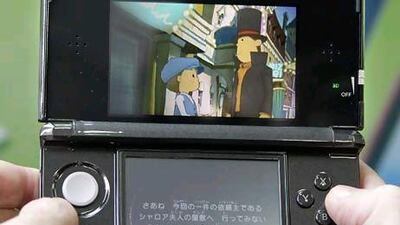The shine has clearly come off Nintendo. Five years after taking the gaming world by storm with its innovative Wii console and handheld DS device, the Japanese company at the end of last week was staring over the edge of a cliff as shareholders abandoned it in droves, fearful it has made its first major misstep.
On July 29 its stock price tumbled by 20 per cent, wiping off billions of dollars of market value. It would have sunk further had the Tokyo Stock Exchange not halted trading in its shares.
That Nintendo Armageddon came a day after it warned it would miss its profit forecast by ¥90 billion (Dh4.31bn), leaving net income at an almost 30-year low as it slashed the price of its new 3D handheld DS in a bid to boost sales of a machine it had hoped would provide new impetus to profit growth.
Investors had been worried about Nintendo for the past few months as initially buoyant sales of the 3D DS collapsed. In June, however, that anxiety grew when it unveiled its successor to the world's most popular game console, the Wii.
The problem was not because of a lack of coolness. Gamers in general, judging by the rave reviews it received, welcomed an upgrade that featured sharper graphics and a funky touch-screen tablet controller. But, because that tablet isn't going to be Wi-Fi capable, it was to many others a further sign of what may turn out to be a strategic flop.
Until very recently Nintendo had to contend only with local rival Sony and Microsoft and in that battle it was the clear winner, in large part because it managed to appeal beyond the core gamers to folk who would not normally consider going out and buying a machine.
Now, however, its products must contend with smartphones and tablet PCs made by Apple, Samsung and others and the social gaming industry that is blossoming around them.
The question that Nintendo has to address, and which so far it seems to be ignoring, is why would a consumer pay a few hundred dollars for one of their machines and then spend more on software, when they can play games on the iPod or iPad for free or, at most, for a few bucks?
Already, the numbers of smartphones in only the few years they have been on the market have far outstripped handheld game machines. Last year an estimated 1 billion smartphones were shipped to consumers, 10 times the combined sales of portable and static game consoles. Add to that a burgeoning tablet market that will sap more consumers away from the devices Nintendo makes and it's easy to see why investors worry that the creator of the Mario Brothers is in trouble.
Nintendo, which got its start in 1889 making playing cards, has a reputation for doing its own thing, even when that means pushing against the tide. When it results in something such as the Wii, which wrong-footed rivals including Sony, it has worked well. If, however, it means sticking stubbornly to a strategy that is out of sync with what consumers want or are prepared to pay, it becomes a liability.
So far the decision makers at Nintendo have shown no signs of implementing a change in course. Satoru Iwata, the president and chief executive of Nintendo, in June said he was puzzled why investors did not like the new Wii.
After the share debacle that began on Friday, Nintendo might be more prepared to flinch and decide on a new direction. It could try to battle it out in hardware against tablet and smartphone fabricators by making the tablet controller for its new console Wi-Fi capable.
Alternatively it could try to grab a piece of the rapidly growing market for social gaming software that threatens to quickly overwhelm the gaming market.
It has oodles of cash earned in the past several bonanza years to fund any new projects and products. The one thing it doesn't have in an ever-changing industry is much time to mull its options.
It is far from game over for Nintendo, but it's going to have to take itself to a new level.

